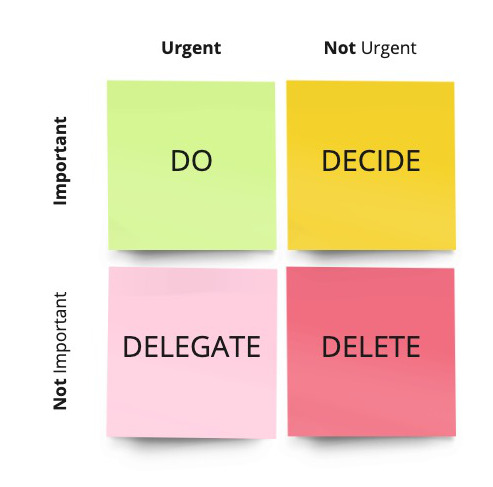Feeling overwhelmed by work is quite a common feeling. Especially if we work on the project for a long time. It did not bring the same joy as at the beginning when everything was new and exciting.
I love to use one concept for management and delegation of tasks in my daily work. If I have to make decisions about tasks, I use the Eisenhower matrix method.

This matrix is really simple to construct. Each quadrant has a clearly defined meaning, and you know what to do with the tasks that fall into a given category.
The method avoids a multitude of urgent and important tasks. A bit like the approach - prevention is better than cure.
Delete
It probably doesn’t need to be prepared if something is on our to-do list. At least now. Probably.
It may be more valuable in a while, or it can be omitted entirely. Often, projects collect thousands of tasks that become irrelevant over time. Requirements and expectations, as well as our knowledge, are changing.
If you don’t want to delete a task right away, it’s better to postpone it so that you can come back to it. This way, it won’t go away forever.
Delegate
Perhaps some of our tasks should be performed by others. Perhaps they know the topic better or have more time for it.
In this category, we should mainly have tasks that do not require our input and specialist knowledge. For example, the onboarding of a new employee can be broken down into several parts. We will focus only on the part where our knowledge of the project is necessary.
Schedule
Tasks from this quadrant can sometimes be delegated, and sometimes you have to do them yourself. However, they are not so urgent to be dealt with now.
I often use such tasks as a moment of rest. I feel satisfied that I was able to do them while eliminating the threat that they would become urgent and important at the same time.
As a reminder, I often use a calendar or reminders on Slack. You can use sticky notes or any other form you prefer.
Do (it right now)
You have to devote all your energy to this category. Alone or with a team, you need to complete the task in the expected time.
If you still have too many tasks, try to delegate them or postpone them. It is also worth eliminating tasks from the nearest deadline.
If you have such tasks (like a sudden production error), do not be afraid to miss the scheduled meetings you have on your calendar. Inform the team about the problem and focus on eliminating it as quickly as possible.
You are responsible for your daily plan
Remember that you determine what you are currently working on. Do not allow to impose tasks, especially their estimates. I’m not talking about independent business decisions. It would help if you understood why a given task is considered extremely important.
Switching context between tasks is costly and can throw you off the beaten track. Finish the task you have and then start the new one.